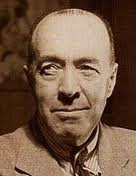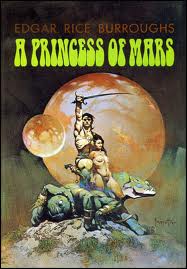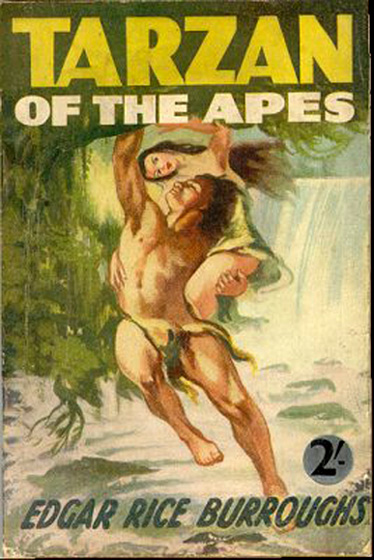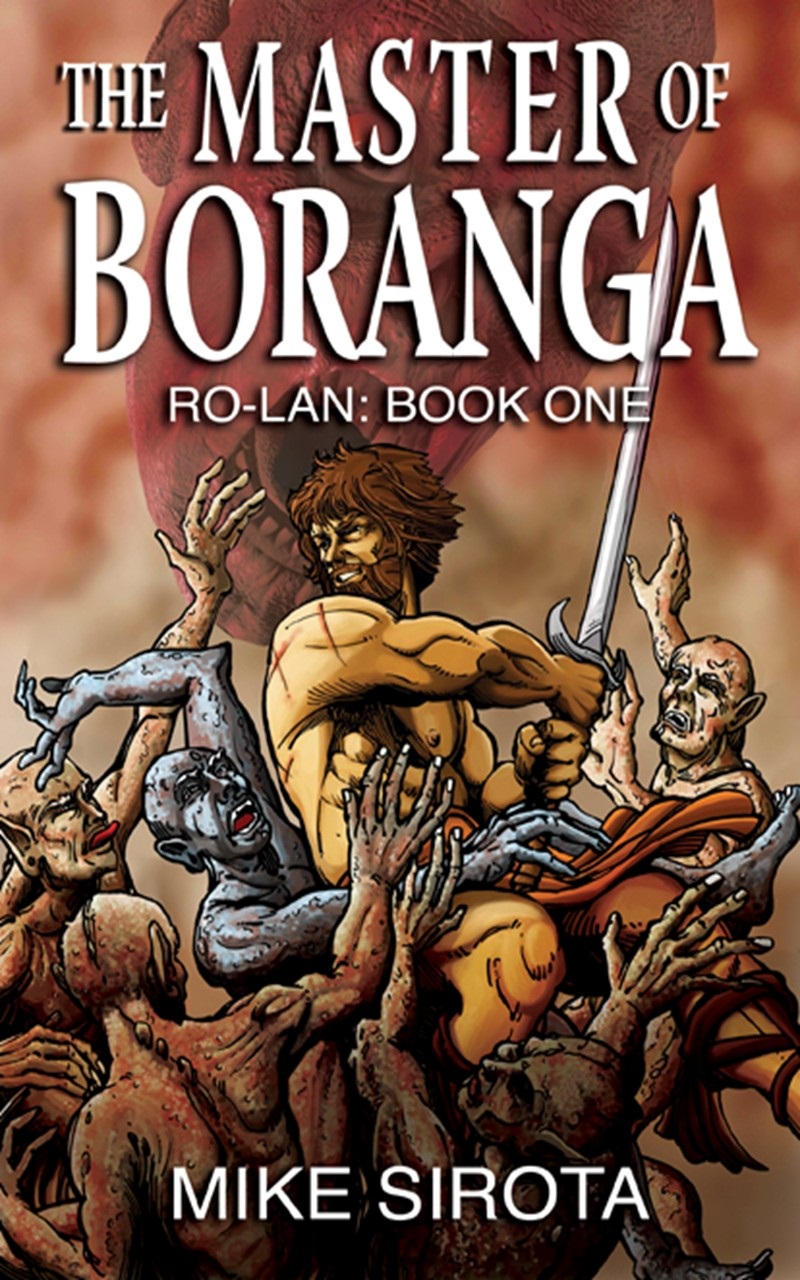In the 1980s I published a sword & sorcery novel titled, The Twentieth Son of Ornon (reissued earlier this year as The Sons of Ornon). It might have been my tenth or eleventh published book at the time; I’m not sure. More important was the dedication/author’s note that I wrote, which I present here verbatim:
THE TWENTIETH SON OF ORNON is not the first book I ever penned, nor is it the first to find print. But it is my personal favorite among the many stories that I’ve so far consigned to paper during my career, and accordingly I wish to dedicate it to my personal favorite among authors, the true Master of adventure fantasy, Edgar Rice Burroughs. It was ERB’s incomparable works that unfettered my own imagination, as well as those of so many others. I offer this in gratitude for the worlds that he created, and in deep respect for his memory.
My childhood in a South Bronx tenement was BOOKS. Anything and everything I could borrow from the New York Public Library, West Farms Branch. That’s when I fell in love with Lord Greystoke, aka Tarzan of the Apes. And John  Carter of Mars. And David Innes of Pellucidar. And Bowen Tyler of Caprona. And so many other memorable characters in the one hundred-plus books that Edgar Rice Burroughs wrote in a career that spanned four decades. Sure, I had many other favorites, but there wasn’t even a close second to ERB. Without having been immersed in his worlds, I doubt if my own worlds of Reglathium, or Shadzea, or Boranga, or Veskia, would have been created. I meant every word of that dedication.
Carter of Mars. And David Innes of Pellucidar. And Bowen Tyler of Caprona. And so many other memorable characters in the one hundred-plus books that Edgar Rice Burroughs wrote in a career that spanned four decades. Sure, I had many other favorites, but there wasn’t even a close second to ERB. Without having been immersed in his worlds, I doubt if my own worlds of Reglathium, or Shadzea, or Boranga, or Veskia, would have been created. I meant every word of that dedication.
I’ve thought a lot about ERB this year for a couple of reasons. The first, sadly, was because of the Disney Studios mega-flop, John Carter, based on ERB’s wonderful Barsoom (Mars) tales of a Virginia soldier of fortune who, while prospecting in Arizona, is miraculously transported to Mars and, subsequently, battles his way through eleven books worth of adventures. (More on this movie in a future post.) The DVD will be released next month, and I hope Disney recoups its losses and then some, so that we might see more of Captain John Carter, a hero not just for the twentieth century but for this century and beyond.
The other reason for thinking a lot about ERB has to do with my rewriting and reissuing many of my earlier works, my second chance at making them right. (Check out my post on second chances.) The Sons of Ornon came out a  couple of months ago, and more recently—like last week—I reissued The Master of Boranga. The significance of this sword & planet story (or adventure fantasy, or lost world) is that, after years of telling myself that I was going to be a writer and not writing a blasted thing, I finally got serious, and Master was the result. (Check out my post, The First Time.) Sure, it was imitative in style and structure, but hey, we all had to start somewhere, and who better to imitate than one of the most popular writers of the twentieth century?
couple of months ago, and more recently—like last week—I reissued The Master of Boranga. The significance of this sword & planet story (or adventure fantasy, or lost world) is that, after years of telling myself that I was going to be a writer and not writing a blasted thing, I finally got serious, and Master was the result. (Check out my post, The First Time.) Sure, it was imitative in style and structure, but hey, we all had to start somewhere, and who better to imitate than one of the most popular writers of the twentieth century?
And I was hardly the only one. Many writers in ERB’s genres have paid homage to him in dedications and the like, among them the great Ray Bradbury. In Irwin Porges’ prodigious 1975 biography, Edgar Rice Burroughs: The Man who Created Tarzan (Brigham Young University Press), Bradbury wrote an introduction titled, “Tarzan, John Carter, Mr. Burroughs, and the Long Mad Summer of 1930.” In it, he talks about falling in love with all of Burroughs’ characters and worlds when he was ten years old. (Hmm, sound familiar?) And remember, in 1930 some of  them had not yet been created. Bradbury says, “[Burroughs’] greatest gift was teaching me to look at Mars and ask to be taken home.” Couldn’t have said it better myself.
them had not yet been created. Bradbury says, “[Burroughs’] greatest gift was teaching me to look at Mars and ask to be taken home.” Couldn’t have said it better myself.
Edgar Rice Burroughs was born in 1875 and died in 1950. His interesting—and sometimes rocky—life deserves a post by itself. It will happen next week.
SWORDS AND SPECTERS: my first thirteen published novels were all in the genres of sword & planet, adventure fantasy, lost world, and sword & sorcery—the latter more in the vein of another favorite writer, Robert E. Howard. The stories were all okay—heck, they got published, which counts for something—but frankly, they weren’t written that well. To paraphrase a part of one review when a later book was published: “Another novel by the most prolific writer of bad fantasy in America.” Oh yeah, knife in the heart! But you know, I have to agree, having re-read all of them last year. That’s why I’m rewriting them all, given everything I’ve learned in three decades as a writing coach and editor.
As my absolute first book, The Master of Boranga (Ro-lan, Book One) needed more than its share of work. But this one held a special place in my heart, so rewriting it was a labor of love. I’m currently revising the second book in the series (there were four), The Shrouded Walls of Kharith, and I’m having a ball. Adventure fantasy is just plain fun. Check it out. Here’s the back cover teaser:
Check it out. Here’s the back cover teaser:
Swept into a nightmarish, other-dimensional world, young American Roland Summers is cast upon the shores of Boranga, a land held in the grip of terror by a creature of unimaginable power.
***
Suddenly, the large front door opened, and Ras-ek emerged. He wore a silver cloak, and a silver turban sat atop his head. His eyes blazed fiercely as he looked over the people, a twisted grin on his face. In a loud, hollow voice he addressed them: “My people, I am Ras-ek Varano,” he told them, adopting the name of the once beloved deity of Boranga, “and this is Sekkator, my home. You have been chosen to be my kuta. We have been sent to the Other Side for a purpose, and now I know of it. I am the Master of Boranga; you are my servants, the rest my slaves. They will learn to live for me, to die for me. They will teach their descendents to fear me. I will rule them forever, for I cannot die!”

To paraphrase, and freely plagiarize, discussions heard while watching The Power of Myth, there will always be room for another telling of The Hero’s Journey. It’s what we all wanted to hear when we said, “Please, just one more story before we have to go to sleep.” Then we would dream of grand adventures like The Master of Boranga.
The influence of classic adventure fantasy is clearly evident in Boranga, as well as the seeds of your future tales from the spirit realm. No spoilers here…but at the end I was left hoping for more adventures from Roland Summers. I am glad to hear that you are now reworking the second book for our enjoyment…and that you’re still insane. (Isn’t that a prerequisite for being a writer?)
Given what we do, insanity is a good thing. I will continue to remain so. 🙂
Hello, Mr. Sirota… Edgar here. Thanks for the nice words. However, I’ve read your work and I must say you have improved the genre immensely since my days. You are a better writer than I was. If I were not dead, I could learn from you.
Just don’t steal any of my Tarzan stuff.
Ah, so it’s been you, Edgar, haunting my small Oceanside abode of late. Ghosts just seem to come in and out of my life at will. Even dead, you’ve always been my spirit guide. Don’t worry, I won’t steal Tarzan…and I have Jane here as a witness. 🙂